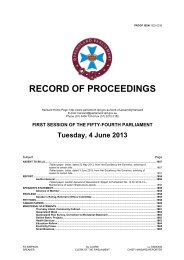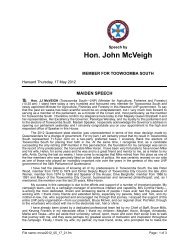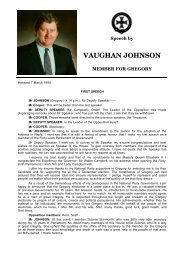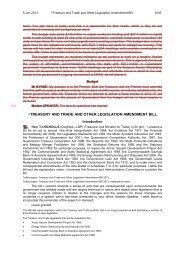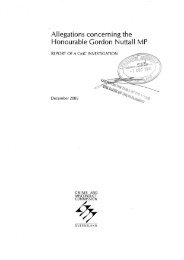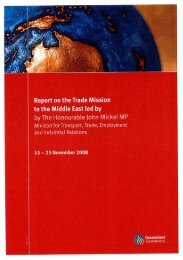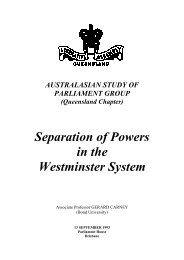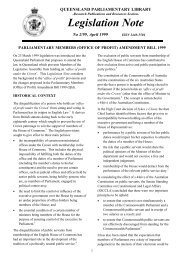weekly hansard - Queensland Parliament - Queensland Government
weekly hansard - Queensland Parliament - Queensland Government
weekly hansard - Queensland Parliament - Queensland Government
Create successful ePaper yourself
Turn your PDF publications into a flip-book with our unique Google optimized e-Paper software.
23 Aug 2005 Succession Amendment Bill 2587<br />
bill were based on the draft Victorian Wills Act 1994, which drew on <strong>Queensland</strong>’s Succession Act.<br />
Consequently, many of the amendments contained in the model legislation were either identical to, or<br />
substantially the same as, corresponding provisions of the Succession Act. However, the model<br />
legislation simplified and modernised the language used and introduced some significant changes to the<br />
law of wills, such as the concept of court authorised wills for minors and people who lack testamentary<br />
capacity.<br />
In December 1997, the <strong>Queensland</strong> Law Reform Commission released report No. 52 on the law<br />
of wills. This report assessed the extent to which the model legislation represented a change in existing<br />
law under the Succession Act and recommended several departures from the model legislation. The bill<br />
implements the model legislation with several modifications recommended by the commission’s report.<br />
The bill does this by replacing part 2 and other miscellaneous provisions of the Succession Act which<br />
deal with the making, revocation, formal validity, interpretation of wills and powers of personal<br />
representatives. The bill brings the law of wills into the 21st century. I seek leave to have the remainder<br />
of my second reading speech incorporated in Hansard.<br />
Leave granted.<br />
I would like to highlight some of the key changes made by the Bill that bring the law of wills into the 21st century.<br />
Changes regarding a minor’s capacity to make a will<br />
Mr Speaker, the Bill extends the current law in relation to a minor’s will-making capacity. Until now, an unmarried person under the<br />
age of 18 years has not been able to make a valid will. This means that if a minor dies before reaching 18, his or her estate is dealt<br />
with according to the intestacy rules that govern what happens to a person’s estate when they die without a will.<br />
The Bill enables a minor to validly make, alter or revoke a will in contemplation of marriage to a particular person—the will takes<br />
effect if and when that marriage is solemnised. This complements the law relating to a minor’s ability to marry under the Marriage<br />
Act 1961 (Cth).<br />
In addition, the Bill expands the Supreme Court’s succession law jurisdiction to enable it to authorise a minor to make, alter or<br />
revoke a will. This recognises there are circumstances in which it is desirable for a child to make a will. For example, a child who<br />
is suffering from a potentially fatal illness or injury may have received a significant inheritance or damages and may want their<br />
estate to be distributed other than in accordance with the intestacy rules which might benefit only the child’s parents. The child<br />
may want their estate to go to one parent only, for example where the minor is estranged from the other parent, or the minor may<br />
wish to benefit another person eg. a particular sibling or a carer.<br />
Before exercising this jurisdiction, the court must be satisfied that the minor understands the nature and effect of the proposed will,<br />
the extent of the property to be disposed under it and that the will reflects the minor’s intentions. The Registrar of the Supreme<br />
Court must be a witness to the will and must retain it in safe custody.<br />
Court-authorised wills for persons lacking testamentary capacity<br />
Mr Speaker, the Bill further expands the court’s succession law jurisdiction to enable it to authorise the making, alteration or<br />
revocation of a will on behalf of a person who lacks testamentary capacity. I consider this to be the most significant and innovative<br />
aspect of the bill. <strong>Queensland</strong> will join jurisdictions including the United Kingdom, South Australia, Tasmania, Victoria and the<br />
Northern Territory in establishing the concept of a statutory will.<br />
Testamentary capacity is essential to the making of a valid will—it requires a testator to know and understand the nature of what<br />
they are doing. The testator must also understand the extent of the property they are dealing with by will and be able to<br />
comprehend and appreciate the claims to which they ought to give effect.<br />
A person who lacks testamentary capacity may never have had the capacity to make a will or they may have lost capacity, for<br />
example, due to injury or disease. Currently when the person dies, their property is distributed according to the intestacy rules. In<br />
the case of a person who has lost capacity, the person may have previously made a valid will which is no longer appropriate due<br />
to a change of circumstances eg. the subsequent birth of a child not mentioned in the will. In these circumstances, the child would<br />
have to bring a family provision application for a share of their parent’s estate.<br />
The statutory will provisions offer a solution in situations where a person’s known intentions would not otherwise be given effect<br />
because of unforeseen circumstances or events eg. accident or illness.<br />
There is no restriction on who can apply for a court-authorised will for a person lacking testamentary capacity. Having regard to<br />
interstate experience, it is anticipated that most applications will be made by the person’s spouse, family member or guardian.<br />
The Bill establishes a two-stage process whereby an applicant must first seek leave of the court to apply for an order. the<br />
requirement for leave is intended to perform a screening function to allow only adequately-founded applications to proceed. A<br />
leave application must be accompanied by comprehensive material including evidence of:<br />
• The person’s lack of testamentary capacity and the likelihood of acquiring or regaining it;<br />
• The size and nature of the person’s estate;<br />
• The person’s testamentary wishes;<br />
• The terms of any previous will;<br />
• The likelihood of someone bringing a family provision application in respect of the person’s estate;<br />
• The circumstances of any other person for whom the person lacking testamentary capacity might reasonably be expected<br />
to make provision for under a will;<br />
• Any other persons who might be entitled to claim on intestacy.<br />
Requiring the applicant to provide such detailed information at this stage will enable the court to gauge the dimensions of the<br />
application at an earlier stage of the process. There will be an opportunity for persons with an interest in the proceedings eg. the<br />
person alleged to lack testamentary capacity, family members etc to be represented and heard at an application for leave hearing.<br />
The court cannot grant leave unless satisfied that:<br />
• The applicant is an appropriate person to make the application;<br />
• Adequate steps have been taken to allow all persons with a proper interest in the application to be represented;<br />
• There are reasonable grounds for believing the person does not have testamentary capacity;



